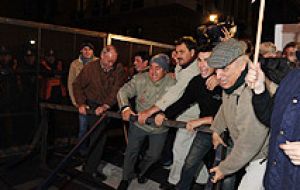MercoPress. South Atlantic News Agency
Argentine congress extends Kirchner’s special taxing powers
 Angry farmers protested the Senate’s vote
Angry farmers protested the Senate’s vote Argentina’s Senate passed a bill extending President Cristina Fernandez de Kirchner’s authority to set export tax rates for one year, further angering farmers who have been confronted with the government for almost two years on the issue.
The Senate voted 38-30 to approve the law, which was already passed by the lower house. Farmers blocked a main road and confronted police in riot gear in the moments before the vote in an effort to remove barriers blocking access to the congressional building in Buenos Aires.
“We are very upset,” said Nestor Roulet, vice president of the Argentine Rural Confederations, after the vote. “My children and my grandchildren are going to have a worse future because our legislators don’t want to legislate.”
The government depends on taxes as high as 35% on exports of soybeans and other agricultural commodities to fund spending on social programs and infrastructure projects. Farmers say the export duties on soybeans, corn and wheat are reducing productivity and making the country less competitive amid lower prices and the worst drought in 70 years.
“In Brazil there aren’t any export taxes,” said Senator Ruben Giustiniani. “In Uruguay there aren’t any export taxes. This is taking us in exactly the opposite direction from where we want to go.”
Government allies said the move gives the president flexibility to react to the changing international economy.
“This is an issue of governability” ruling party Senator Miguel Pichetto said at the conclusion of the debate. “The ability to fix tariffs on imports and exports is of the utmost importance to allow the Executive branch to react rapidly in very complicated international markets.”
Opposition leaders said the move was an abdication of congress’s responsibilities and a rejection of the country’s June 28 mid-term elections, in which the president’s party was defeated in Argentina’s biggest provinces. However the new lawmakers don’t take office until Dec. 10.
“The people voted for change and we aren’t respecting that,” Senator Hilda Duhalde said during the debate. “I think the new Congress will reverse this decision.”
The Buenos Aires Cereals Exchange said earlier this month that Argentina, the world’s fourth-largest wheat exporter in 2008, may withdraw from global markets for the first time in at least a century as drought slashes the harvest. The country is also expected to be forced to import fresh milk, dairy produce and beef next year if there are no changes to the current policy of heavily taxing rural production.
On the political front, and is spite of victory in June, the opposition remains divided, there is still no clear candidate to replace Mrs. Kirchner’s husband and former president Nestor Kirchner as the clear leader for the 2011 presidential election and the whole political system is quite aware of the institutional fragility of the Kirchner couple situation.




Top Comments
Disclaimer & comment rulesCommenting for this story is now closed.
If you have a Facebook account, become a fan and comment on our Facebook Page!